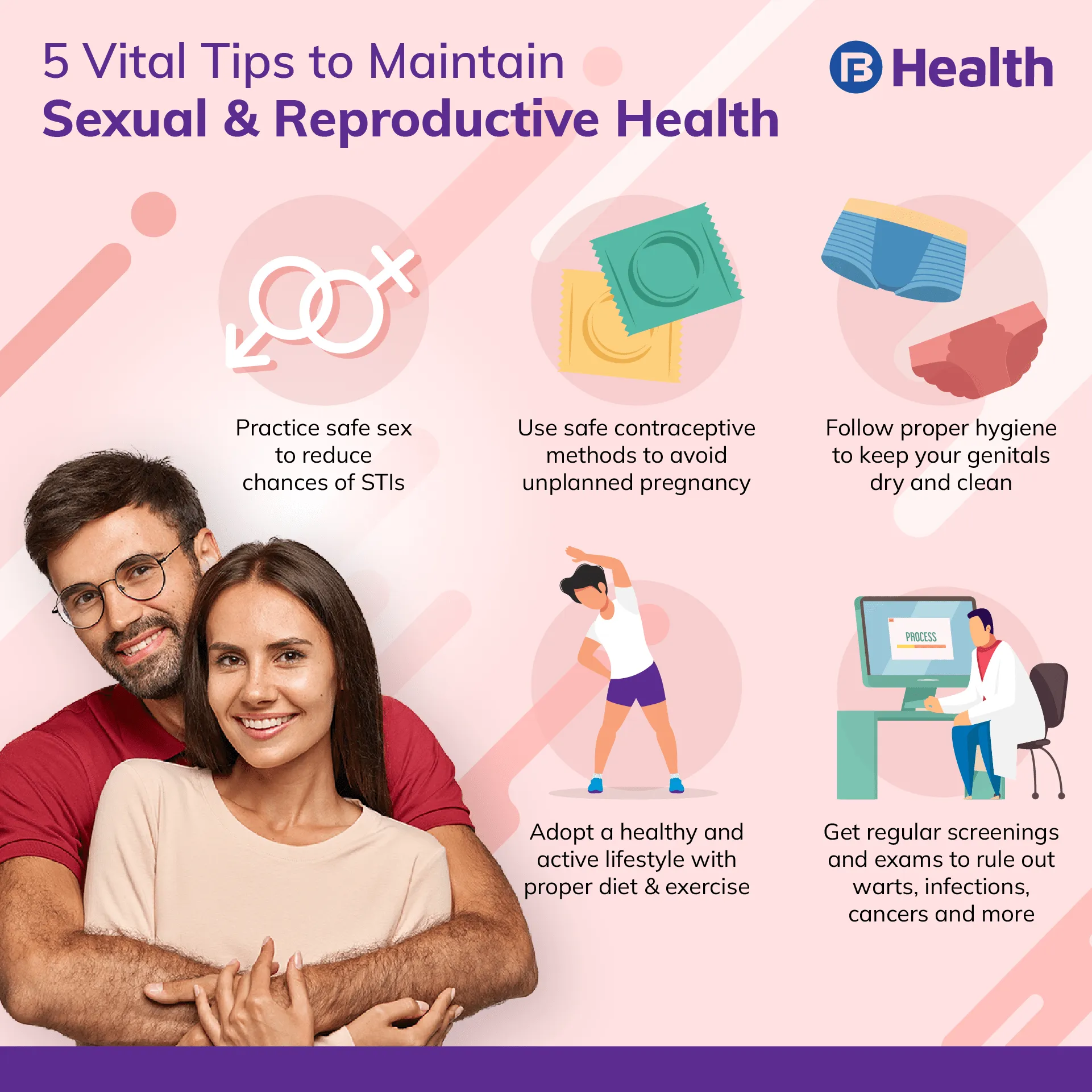General Health | 4 min read
Sexual Health Awareness Month: How Important is Sexual and Reproductive Health?
Medically reviewed by
Table of Content
Key Takeaways
- September is marked as Sexual Health Awareness Month
- February is observed as Reproductive Health Awareness Month
- We all need to have and create reproductive health awareness
Sexual and reproductive health relates to your physical, social and mental well-being. To ensure good sexual and reproductive health, be well-informed about safe and effective contraceptives. It is also vital to know about various sexually transmitted infections and how to prevent your chances of contracting them [1]. Learning about the importance of safe pregnancy and delivery is also part of having awareness about reproductive health. However, all these are personal choices, and you are responsible for making them in a way that benefits you and your partner.
In order to create awareness about these crucial issues, Sexual Health Awareness Month is celebrated in September and Reproductive Health Awareness Month is observed in February every year.
To know more about sexual health awareness and the importance of reproductive health awareness, read on.
Additional article: How Women Over 30 Can Address Their Health Proactively
What is Reproductive Health Awareness?
Reproductive health awareness is essential to realize the importance of making crucial choices about your body with regards to pregnancy and contraception. Lack of awareness is the prime reason for deteriorating health and deaths among women. Whether it is unplanned pregnancy, unsafe abortion methods, or any sexually transmitted infections (STIs), women and men need to be well-educated on the importance of reproductive health.
To focus on reproductive health, it is vital that you follow safe and convenient contraception methods and safeguard your reproductive system from STIs [2]. Choose any of these contraceptive options after consulting your gynecologist [3].
- Sterilization
- Barrier methods by inserting a sponge, condoms or cervical caps
- Inserting intrauterine devices or hormonal implants
- Prescribed birth control pills
For protection against STIs, male and female condoms are the most effective alternatives. Not only do they stop unplanned pregnancy, but you also get added protection from sexually transmitted infections. It is essential to check your reproductive health regularly and see if you have contracted any infection. It is easy to overlook STI symptoms. Only a routine checkup can help in detecting infections like genital herpes, gonorrhea or chlamydia.
Celebrating or participating in various activities during Reproductive Health Awareness Month helps address issues like infertility, menopause and puberty. By taking youth for reproductive health awareness programs, you can help them better manage emotional and physical changes that occur during puberty. Here they can also learn how to practice better hygiene that is essential to keep them safe from vaginal and other infections.
Additional read: Women’s Wellness: 6 Effective Tips to Boost the Female Reproductive System
What Is Sexual Health Awareness?
It is important to take care of your sexual health by going for cancer screening tests regularly, be it for breasts, the cervix or the prostrate. Doing a self-examination also helps detect problems at an early stage. A testicular examination involves checking a presence of lump on the testicle. If so, you may have to meet a doctor to rule out the possibility. A self-examination of breasts may not give you accurate results of cancer detection if not done properly. However, if you feel a presence of lump in your breasts after pressing it hard, it is better to consult a doctor.
Check for these signs and symptoms of STIs.
- Bleeding between period cycles
- Burning sensation when passing urine
- Persistent pain in pelvic area
- Itching in your genitals
- Heaviness in testicles
Your doctor may perform a pelvic or testicular examination to check for any infection. If required, undergo a pap smear test.

How is Sexual Health Awareness Month Observed?
September is marked as Sexual Health Awareness Month every year. It is during this month that World Sexual Health Day is also observed, that is, on September 4. Celebrating this month helps us remember to improve our knowledge on sexual health. The theme for Sexual Health Awareness Week 2021 is Turn It On: Sexual Health In A Digital World. This motto was chosen to raise awareness of sexual rights and importance of sexual health in times where most of us are online. Many digital resources in the form of podcasts and fact sheets are available online, which can be accessed by all throughout this month.
This can not only prevent the spread of STIs, but also reduce infertility and abortions. To get your questions answered privately and comfortably, reach out to top specialists on Bajaj Finserv Health and book an online consultation. This way, you can take healthy measures towards your reproductive and sexual health.
References
- https://www.ashasexualhealth.org/celebrating-sexual-health-september/
- https://www.optionsforsexualhealth.org/srh-awareness-week/
- https://www.nhp.gov.in/about-sexual-and-reproductive-health-awareness-day_pg
- https://www.cdc.gov/women/observances/index.htm
- https://nationaltoday.com/sexual-health-month/
- https://www.healthline.com/health/directory-awareness-months#september
- https://www.actioncanadashr.org/srhweek
- https://www.unfpa.org/sexual-reproductive-health#readmore-expand
- https://www.medindia.net/news/healthwatch/sexual-and-reproductive-health-awareness-day-sexual-health-education-199866-1.htm
- https://worldsexualhealth.net/world-sexual-health-day/
- https://whri.org/world-sexual-health-day-2021/
Disclaimer
Please note that this article is solely meant for informational purposes and Bajaj Finserv Health Limited (“BFHL”) does not shoulder any responsibility of the views/advice/information expressed/given by the writer/reviewer/originator. This article should not be considered as a substitute for any medical advice, diagnosis or treatment. Always consult with your trusted physician/qualified healthcare professional to evaluate your medical condition. The above article has been reviewed by a qualified doctor and BFHL is not responsible for any damages for any information or services provided by any third party.





